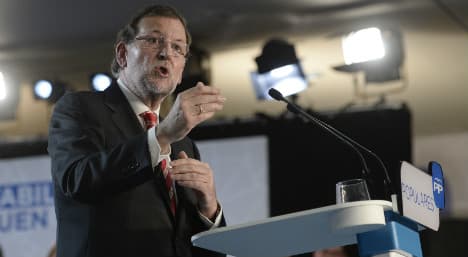Rajoy: No challenges to Spain's unity allowed

Spanish Prime Minister Mariano Rajoy has said in Catalonia that he would not allow any challenge to national unity, on his first visit to the region since its symbolic vote on independence.
"I will not allow challenges to the unity of Spain," Rajoy said in a speech to supporters of his conservative Popular Party in the region's main city of Barcelona.
"No one should have to choose between being Catalan or Spanish."
It was Rajoy's first visit to the wealthy northeastern region since a symbolic vote on independence which Madrid tried to stop with a court injunction.
Rajoy, who had promised to go to Catalonia to "better explain" his position, slammed Catalan President Artur Mas, who now hopes to organise early regional elections centred on independence, which would include a joint list of candidates favouring secession.
"Never in history has a ruler lost so much time organising elections, nor generated so much instability," Rajoy said, vowing to "maintain the stability" of Spain.
The Catalan government says 2.3 million people took part in the November 9 vote -- about a third of all eligible voters in the region.
Roughly 80 percent of those who took part voted for Catalonia to be independent state. However the majority of anti-independence voters stayed at home.
Rajoy said Saturday that Madrid had helped Catalonia financially many times since the start of the economic crisis that has shaken Spain since 2008.
Many in the region dispute such statements, saying that Catalonia accounts for around a fifth of Spain's economic output but does not receive investments in proportion to the taxes it pays.
Mas said Tuesday that early elections were now the "only" way to allow Catalans to voice their opinion.
"We need to know with precision if there is a clear majority in Catalonia to have a state or not," Mas said.
The elections would be part of a six-step process to be completed before the end of 2016.
But, although nearly two million people voted 'Yes' in the symbolic ballot, analysts say nationalists will struggle for a majority in their drive to break away from Spain.
Recent opinion polls have suggested Catalans are divided roughly half-and-half for and against independence, but estimates fluctuate.
Support for independence is strongest in rural areas, but it is less strongly rooted in the industrial zone around Barcelona and other key coastal areas.
Spanish public prosecutors on Friday filed suits against Mas and two other senior members of the Catalan government for going ahead with the symbolic vote despite it being ordered suspended by Spain's constitutional court.
Catalonia held the poll after plans to stage an official non-binding referendum were also suspended when the Spanish government challenged its legality.
Comments
See Also
"I will not allow challenges to the unity of Spain," Rajoy said in a speech to supporters of his conservative Popular Party in the region's main city of Barcelona.
"No one should have to choose between being Catalan or Spanish."
It was Rajoy's first visit to the wealthy northeastern region since a symbolic vote on independence which Madrid tried to stop with a court injunction.
Rajoy, who had promised to go to Catalonia to "better explain" his position, slammed Catalan President Artur Mas, who now hopes to organise early regional elections centred on independence, which would include a joint list of candidates favouring secession.
"Never in history has a ruler lost so much time organising elections, nor generated so much instability," Rajoy said, vowing to "maintain the stability" of Spain.
The Catalan government says 2.3 million people took part in the November 9 vote -- about a third of all eligible voters in the region.
Roughly 80 percent of those who took part voted for Catalonia to be independent state. However the majority of anti-independence voters stayed at home.
Rajoy said Saturday that Madrid had helped Catalonia financially many times since the start of the economic crisis that has shaken Spain since 2008.
Many in the region dispute such statements, saying that Catalonia accounts for around a fifth of Spain's economic output but does not receive investments in proportion to the taxes it pays.
Mas said Tuesday that early elections were now the "only" way to allow Catalans to voice their opinion.
"We need to know with precision if there is a clear majority in Catalonia to have a state or not," Mas said.
The elections would be part of a six-step process to be completed before the end of 2016.
But, although nearly two million people voted 'Yes' in the symbolic ballot, analysts say nationalists will struggle for a majority in their drive to break away from Spain.
Recent opinion polls have suggested Catalans are divided roughly half-and-half for and against independence, but estimates fluctuate.
Support for independence is strongest in rural areas, but it is less strongly rooted in the industrial zone around Barcelona and other key coastal areas.
Spanish public prosecutors on Friday filed suits against Mas and two other senior members of the Catalan government for going ahead with the symbolic vote despite it being ordered suspended by Spain's constitutional court.
Catalonia held the poll after plans to stage an official non-binding referendum were also suspended when the Spanish government challenged its legality.
Join the conversation in our comments section below. Share your own views and experience and if you have a question or suggestion for our journalists then email us at [email protected].
Please keep comments civil, constructive and on topic – and make sure to read our terms of use before getting involved.
Please log in here to leave a comment.